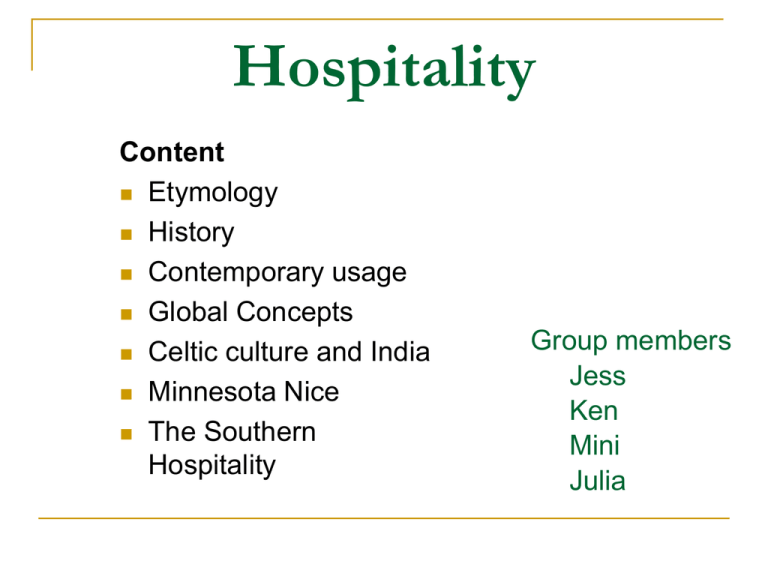History of Hospitality
advertisement

Hospitality Content Etymology History Contemporary usage Global Concepts Celtic culture and India Minnesota Nice The Southern Hospitality Group members Jess Ken Mini Julia Etymology from Latin, hostis (stranger) and hostire (equalize or compensate) Strangers were rare in those days; the concept of hospitality helped ease the encounter Literally, the meaning of “host” can be read as “lord of strangers,” have to manage and serve strangers History of Hospitality In Homeric age, Hospitality was the chief deity under the protection of Xenios Zeus The sacredness of hospitality in Greek concept was illustrated in the story of Telemachus and Nestor, in which Nestor welcomes Telemachus and his party (strangers), lavishly providing them protection and guidance The host should make the stranger feel protected and taken care of, and guide him to his next destination Contemporary usage of Hospitality Rather than protection and survival, it now has more to do with etiquette and entertainment, but still involves showing respect to the guests, satisfying their needs, and treating them as equals Hospitality service industries offer guidance and comfort; related institutions like hospital, hospice, and hotel preserves more connotation in personal care Lot’s story: Biblical and Middle Eastern A mob wanted to rape his guests Eastern Culture, it was considered →offer his own daughters norm to take care of the strangers as substitute In Middle a cultural and foreigners living among you. The Biblical commands and examples : Genesis (the most extreme one) The obligations of both host and guest are stern. an Arab story The distinction is formed by eating salt under the roof. Classical World To the ancient Greeks and Romans, hospitality was a divine right. Xenia (foreign), the ancient Greek concept of hospitality the importance of hospitality the tale of Baucis and Philemon Zeus and Hermes are visiting the town of Phrygia, disguised as simple peasants → meet a lot of closed doors → the house of Philemon and Baucis → act as good hosts →→ the rest of the unhospitable town was flooded while P and B were saved Concept of hospitality →100% Protection Ex: Story of the Scottish Clan Macgregor from the early seventeenth century. Fighting clans reached peace only when one member of one clan showed hospitality toward a member of the other clan. Concept of hospitality:“Atithi Devo Bhava”=The guest is God = “What goes around comes around” Minnesota Nice courteous, reserved and mild-mannered Polite friendliness Aversion to confrontation Tendency toward understatement Not making a fuss or standing out Emotional restraint Self-deprecation Negative Qualities? 1. passive aggressiveness 2. resistance to change Despite the two negative qualities, a national study in 2008 indicates that Minnesota is the second most agreeable and fifth extroverted state in the U.S.A. Social Norms 1. 2. 3. Isn’t really about being “nice” but Keeping up appearance Maintaining the social order Keeping people in the place no confrontational verbs or statements of strong personal preference Southern Hospitality 1. 2. Definition: Residents in Southern United States are particularly warm and welcoming to visitors to their homes. Characteristics: Conversation flows cheeringly—to make the guests happy After dinner, one will be urged to pass the afternoon and night. Hospitality in Food 1. a cake or other delicacy —for the new neighbors as a mechanism of instruction about rules of the community 2. clubs and church functions —include a meal or at least a dessert and beverage 3. when death or serious illness occurs —people would provide free food to the bereaved family for a period of time 4. Cooking enough food for everyone Critical examination Sociologists characterized Southern Hospitality as a masquerade designed to cover up deficiencies in southern culture, such as slavery, discrimination widespread poverty Also reflected as deeply-held religious beliefs of the region Minnesota Nice beats Southern Hospitality at a stick, what’s the trick? http://www.youtube.com/watch?v=3WhmBHg 0GX4











